| Listing 1 - 10 of 18 | << page >> |
Sort by
|
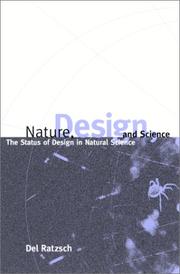
ISBN: 0791490998 0791448932 9780791448939 0791448940 9780791448946 9780791490990 Year: 2001 Publisher: Albany State University of New York Press
Abstract | Keywords | Export | Availability | Bookmark
 Loading...
Loading...Choose an application
- Reference Manager
- EndNote
- RefWorks (Direct export to RefWorks)
"Although the scientific illegitimacy of supernatural design is typically asserted with enormous confidence and vigor, there has been surprisingly little actual work on such key foundational issues as even what design is and on specific criteria for assessing its legitimacy, or lack, as a scientific concept. However, intelligent supernatural design is again surfacing in discussions both of anthropic principles and of certain types of biological complexity. This book develops a definition of design, explicates the more specific concept of supernatural design, defends a general criterion for scientific legitimacy, and argues that in some cases the concept of intelligent supernatural design can meet the relevant requirements for scientific legitimacy."--Jacket.
Religion and science. --- God --- Religion and science --- Religion --- Religion - General --- Philosophy & Religion --- Metaphysics --- Misotheism --- Theism --- Christianity and science --- Geology --- Geology and religion --- Science --- Science and religion --- Teleological argument --- Teleology --- Intelligent design (Teleology) --- Proof, Teleological. --- Proof, Teleological --- Religious aspects
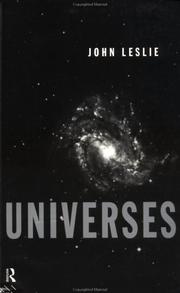
ISBN: 0415041449 0415139554 9780203053188 0203053184 9780415041447 9780415139557 0203053184 1134770669 0203283813 1280194928 1134770677 Year: 1989 Publisher: London Routledge
Abstract | Keywords | Export | Availability | Bookmark
 Loading...
Loading...Choose an application
- Reference Manager
- EndNote
- RefWorks (Direct export to RefWorks)
Universes discusses the alleged evidence of fine tuning; mechanisms by which a varied set of Universes might be generated, and whether belief in God could be preferable to accepting universes in vast numbers.
Cosmology. --- God. --- Philosophy of nature. --- Teleology. --- Cosmology --- God --- Teleology --- Design in natural phenomena, Study of --- Final cause --- Philosophy --- Causation --- Evolution --- Necessity (Philosophy) --- Astronomy --- Deism --- Metaphysics --- Teleological argument --- Intelligent design (Teleology) --- Proof, Teleological --- Proof, Teleological. --- Cosmologie --- Dieu --- Finalité --- Existence --- Preuve téléologique --- Philosophy of nature --- God - Proof, Teleological.
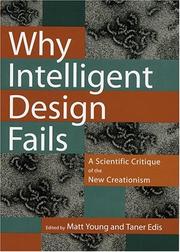
ISBN: 0813560322 1280540060 9786610540068 0813537487 9780813537481 081353433X 9780813534336 9781280540066 Year: 2004 Publisher: New Brunswick, N.J. Rutgers University Press
Abstract | Keywords | Export | Availability | Bookmark
 Loading...
Loading...Choose an application
- Reference Manager
- EndNote
- RefWorks (Direct export to RefWorks)
Intelligent design (Teleology) --- Creationism. --- Evolution. --- Philosophy --- Creation --- Emergence (Philosophy) --- Teleology --- Creation science --- Scientific creationism --- Modernist-fundamentalist controversy --- Bible and evolution --- Evolution (Biology) --- Design, Intelligent (Teleology) --- Natural theology --- Philosophy of nature --- Creationism --- God --- Religious aspects --- Christianity --- Proof, Teleological
Book
ISBN: 1283154951 9786613154958 0643095314 9780643095311 9781283154956 9780643099548 0643099549 Year: 2007 Publisher: Collingwod, Vic. : CSIRO Pub.,
Abstract | Keywords | Export | Availability | Bookmark
 Loading...
Loading...Choose an application
- Reference Manager
- EndNote
- RefWorks (Direct export to RefWorks)
Looks at what science asks us to believe about aspects of reality, and considers the implications of accepting the scientific world view.
Science --- Religion and science. --- Environmentalism --- Intelligent design (Teleology) --- Design, Intelligent (Teleology) --- Natural theology --- Philosophy of nature --- Teleology --- Creationism --- God --- Christianity and science --- Geology --- Geology and religion --- Science and religion --- Normal science --- Philosophy of science --- Philosophy. --- Proof, Teleological --- Religious aspects
Book
ISBN: 077342038X 9780773420380 9780773415669 0773415661 Year: 2011 Publisher: Lewiston, N.Y. Edwin Mellen Press
Abstract | Keywords | Export | Availability | Bookmark
 Loading...
Loading...Choose an application
- Reference Manager
- EndNote
- RefWorks (Direct export to RefWorks)
With his extraordinary command over English and his ability to transmit ideas clearly, Meynell takes on the concept of atheism and what he labels as Schleiermacher's cultured 'despisers of religion'. He argues that the concept of God is a rational belief and that the awareness of divinity illuminates the path for science. Not only does Meynell defend the existence of God, but also Christianity itself. He describes it as a form of dispensation to meet our human condition which acts as a substitute to the atheistic materialist alternative. Meynell adds that there is much to be learned from other
Apologetics. --- Christianity and atheism. --- God -- Proof, Moral. --- God -- Proof, Teleological. --- Knowledge, Theory of (Religion). --- Apologetics --- Christianity and atheism --- Knowledge, Theory of (Religion) --- God --- Religion --- Philosophy & Religion --- Christianity --- Metaphysics --- Misotheism --- Theism --- Epistemology, Religious --- Religious epistemology --- Religious knowledge, Theory of --- Theology, Doctrinal --- Atheism and Christianity --- Atheism --- Apologetics, Missionary --- Christian evidences --- Evidences, Christian --- Evidences of Christianity --- Fundamental theology --- Polemics (Theology) --- Theology, Fundamental --- Religious thought --- Theology --- Proof, Teleological --- Proof, Moral --- Philosophy --- Evidences
Book

ISBN: 9814508713 1299652050 9814508721 Year: 2013 Publisher: World Scientific Publishing Co.
Abstract | Keywords | Export | Availability | Bookmark
 Loading...
Loading...Choose an application
- Reference Manager
- EndNote
- RefWorks (Direct export to RefWorks)
In the spring of 2011, a diverse group of scientists gathered at Cornell University to discuss their research into the nature and origin of biological information. This symposium brought together experts in information theory, computer science, numerical simulation, thermodynamics, evolutionary theory, whole organism biology, developmental biology, molecular biology, genetics, physics, biophysics, mathematics, and linguistics. This volume presents new research by those invited to speak at the conference.The contributors to this volume use their wide-ranging expertise in the area of biological
Genomics --- Molecular genetics --- Cell interaction --- Mutation (Biology) --- Intelligent design (Teleology) --- Design, Intelligent (Teleology) --- Natural theology --- Philosophy of nature --- Teleology --- Creationism --- God --- Genetics --- Variation (Biology) --- Proof, Teleological --- Molecular Biology --- Mutation/Selection Paradigm --- Numerical Simulation --- Mathematics --- Biophysics --- Physics --- Thermodynamics --- Information Theory --- Evolutionary Theory --- Computer Science --- Linguistics --- Developmental Biology --- Biological Information --- Whole Organism Biology
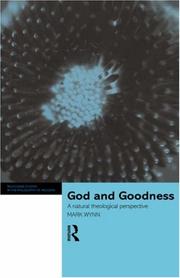
ISBN: 113463823X 128031737X 9786610317370 0203456882 0203258266 9780203258262 9780203456880 9780415199155 0415199158 6610317372 9781134638185 9781134638222 9781134638239 9780415862738 1134638221 Year: 1999 Publisher: London New York Routledge
Abstract | Keywords | Export | Availability | Bookmark
 Loading...
Loading...Choose an application
- Reference Manager
- EndNote
- RefWorks (Direct export to RefWorks)
God and Goodness presents a fresh approach, arguing that the goodness of the world echoes the goodness of its source. It makes a case for supposing that the world exists because it is good that it should exist.
God --- Theodicy. --- Faith. --- Religious belief --- Theological belief --- Belief and doubt --- Religion --- Salvation --- Theological virtues --- Trust in God --- Evil, Problem of (Theology) --- Permissive will of God --- Problem of evil (Theology) --- Good and evil --- Teleological argument --- Teleology --- Intelligent design (Teleology) --- Proof, Teleological. --- Permissive will --- Will, Permissive
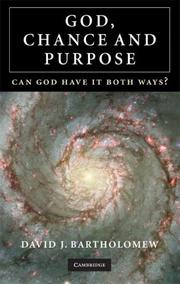
ISBN: 9780521880855 0521880858 9780521707084 0521707080 9780511807701 0511387237 9780511388224 0511388225 9780511387234 0511807708 9780511380396 0511380399 9786611254896 6611254897 9780511384370 0511384378 1107184606 0511383509 0511385331 1281254894 0511386206 0511382561 Year: 2008 Publisher: Cambridge Cambridge University Press
Abstract | Keywords | Export | Availability | Bookmark
 Loading...
Loading...Choose an application
- Reference Manager
- EndNote
- RefWorks (Direct export to RefWorks)
Scientific accounts of existence give chance a central role. At the smallest level, quantum theory involves uncertainty and evolution is driven by chance and necessity. These ideas do not fit easily with theology in which chance has been seen as the enemy of purpose. One option is to argue, as proponents of Intelligent Design do, that chance is not real and can be replaced by the work of a Designer. Others adhere to a deterministic theology in which God is in total control. Neither of these views, it is argued, does justice to the complexity of nature or the greatness of God. The thesis of this book is that chance is neither unreal nor non-existent but an integral part of God's creation. This view is expounded, illustrated and defended by drawing on the resources of probability theory and numerous examples from the natural and social worlds.
Natural theology --- Chance --- Intelligent design (Teleology) --- Providence and government of God --- 215 --- 231.51 --- God --- Fortune --- Necessity (Philosophy) --- Probabilities --- 231.51 De Deo creatore. Schepping --- De Deo creatore. Schepping --- Design, Intelligent (Teleology) --- Philosophy of nature --- Teleology --- Creationism --- Godsdienst en wetenschap --- Providence and government --- Sovereignty --- Proof, Teleological --- Providence and government of God. --- Chance. --- Arts and Humanities --- Philosophy
Book
ISBN: 9789812794123 9812794123 9812794107 9789812794109 9812794115 9789812794116 Year: 2008 Publisher: Singapore Hackensack, NJ World Scientific
Abstract | Keywords | Export | Availability | Bookmark
 Loading...
Loading...Choose an application
- Reference Manager
- EndNote
- RefWorks (Direct export to RefWorks)
This interesting book reviews WMAP's main results (2003) and discusses in detail how the accurate qualitative results for the "age" of the universe and the Hubble constant were anticipated in an article published five years before in Acta Cosmologica, Krakow. In the final chapter on "Cosmic Numbers", it is shown that, as a result of the coincidence at decoupling time between atom formation and matter/radiation equality, a reasonable cosmic justification for the mass ratio of protons and electrons is obtained.
Cosmology. --- Astrophysics. --- Cosmic physics. --- Cosmic background radiation. --- Big bang theory. --- Intelligent design (Teleology) --- Design, Intelligent (Teleology) --- Natural theology --- Philosophy of nature --- Teleology --- Creationism --- God --- Big bang cosmology --- Superdense theory --- Cosmogony --- Cosmology --- Expanding universe --- Background radiation, Cosmic --- Cosmic microwave background --- Cosmic microwave radiation --- Microwave background --- Extraterrestrial radiation --- Physics --- Space sciences --- Astronomical physics --- Astronomy --- Cosmic physics --- Deism --- Metaphysics --- Proof, Teleological --- Cosmic Background Explorer (Satellite) --- COBE (Satellite)
Book
ISBN: 9780521190466 0521190460 9780521148863 0521148863 9780511760914 9780511932663 0511932669 0511760914 0511852517 1107203910 1282908243 9786612908248 051193131X 0511927479 0511924933 0511929986 Year: 2010 Publisher: New York Cambridge University Press
Abstract | Keywords | Export | Availability | Bookmark
 Loading...
Loading...Choose an application
- Reference Manager
- EndNote
- RefWorks (Direct export to RefWorks)
"Based on their survey of high school biology teachers, Michael Berkman and Eric Plutzer show that it is individual educators who often make critical decisions about what children are taught about evolution"--Provided by publisher. "Who should decide what children are taught in school? This question lies at the heart of the evolution-creation wars that have become a regular feature of the U.S. political landscape. Ever since the 1925 Scopes "monkey trial" many have argued that the people should decide by majority rule and through political institutions; others variously point to the federal courts, educational experts, or scientists as the ideal arbiter. Michael Berkman and Eric Plutzer illuminate who really controls the nation's classrooms. Based on their innovative survey of 926 high school biology teachers they show that the real power lies with individual educators who make critical decisions in their own classrooms. Broad teacher discretion sometimes leads to excellent instruction in evolution. But the authors also find evidence of strong creationist tendencies in America's public high schools. More generally, they find evidence of a systematic undermining of science and the scientific method in many classrooms"--Provided by publisher.
Evolution --- Creationism --- Intelligent design (Teleology) --- Créationisme --- Dessein intelligent --- Study and teaching (Primary) --- Etude et enseignement (Primaire) --- 213 --- Schepping. Emanatisme. Evolutionisme. Creationisme. Eeuwigheid van de wereld --- Créationisme --- Human evolution --- Design, Intelligent (Teleology) --- Creation science --- Scientific creationism --- Natural theology --- Philosophy of nature --- Teleology --- God --- Evolution (Biology) --- Physical anthropology --- Evolutionary psychology --- Human beings --- Modernist-fundamentalist controversy --- Bible and evolution --- Creation --- Proof, Teleological --- Origin --- Religious aspects --- Christianity --- Social Sciences --- Political Science
| Listing 1 - 10 of 18 | << page >> |
Sort by
|

 Search
Search Feedback
Feedback About UniCat
About UniCat  Help
Help News
News